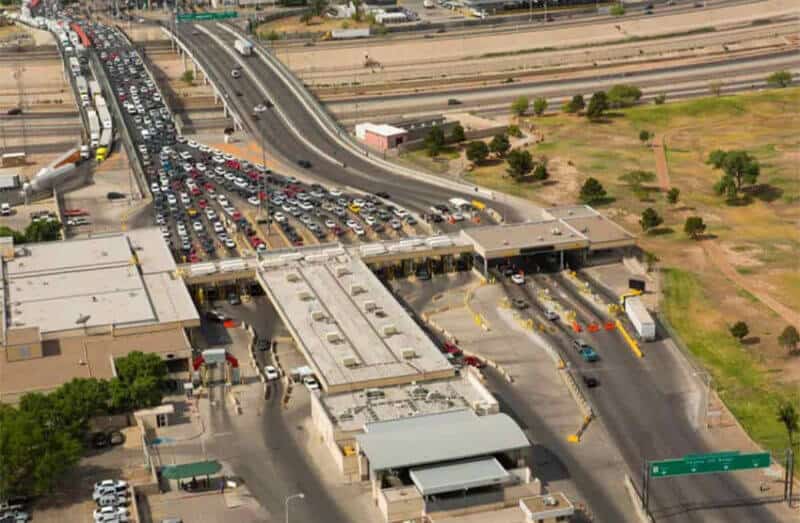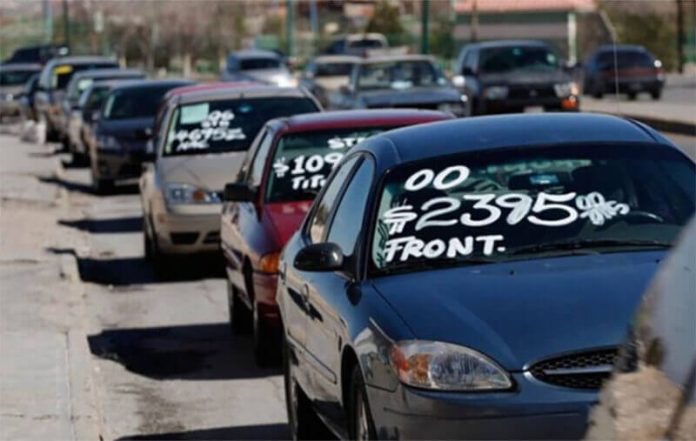President López Obrador’s plan to regularize illegally imported cars will only reward the criminal groups that bring them into the country, according to the Mexican Association of Automotive Distributors (AMDA).
López Obrador announced Wednesday that an amnesty agreement to regularize such cars – the vast majority of which come from the United States – would be signed this Saturday. He said that registration would be low in cost, given that many of the owners of illegal vehicles have low incomes.
The AMDA said in a statement that the legalization of so-called autos chocolate (chocolate cars) “will represent a prize for the mafias that get rich with the smuggling of these kinds of vehicles.”
It also said that regularization will hurt sales in the formal automotive sector, which creates jobs and pays taxes.
“… The proposal to regularize illegal vehicles … will not be limited to … border states but will extend throughout the country, [creating a] situation that far from limiting the problem will make it bigger,” the AMDA said.
The association said it has been seeking a meeting with the president since late June after he announced his intention to regularize the vehicles during a visit to Baja California.
AMDA president Guillermo Rosales told the newspaper El Financiero that López Obrador offered to meet with the association to discuss “the best regulatory practices” for the used vehicle sector but the meeting never occurred.
“We weren’t summoned to collaborate or give an opinion,” he said.
The AMDA said in its statement that the illegal importation of used cars has increased since the president first indicated he was willing to allow the regularization of autos chocolate, which were formerly called autos chuecos, or crooked cars, in the northern border region until chueco morphed into choco and choco became chocolate.
“… During July and August the legal importation of used vehicles grew 69.8% and 84.9%, or 5,655 and 6,493 additional units, respectively, while the illegal entry [of vehicles] grew by the same or greater percentages due to the expectation of being able to regularize them shortly,” it said.
“… The upcoming legalization will cause a drop in value of up to 20% for national vehicles of the same year and model due to the oversupply it will cause,” the AMDA said.

“We’re against the legalization of contraband,” Rosales told El Financiero, reiterating that the move “will only benefit the mafias that benefit from this crime.”
The AMDA chief said he will wait to see the details of the amnesty agreement before looking at the legal options the association has to defend the formal automotive sector.
“… If this decree is signed, the entry of these vehicles, many of them junk, will increase and it could cause damage to the economy as occurred when [former president] Vicente Fox signed [a similar] decree in 2006,” Rosales said.
The Mexican Employers Federation (Coparmex) also criticized López Obrador’s plan, saying it represents a “severe blow to one of the industries that creates the most jobs in the country.”
“… The regularization of autos chocolate seriously threatens the recovery of a key sector … as according to estimates of the Mexican Association of Automotive Distributors, this action could cause a 39% decline in domestic market sales,” Coparmex said in a statement.
“… For Coparmex, the regularization of autos chocolate announced by the president means rewarding illegality. It’s an attack on companies and jobs in Mexico,” the organization said, adding that López Obrador’s plan is motivated by a desire to garner more support for his government.
The Associated Press reported that some estimates place the number of autos chocolate in the country as high as 18 million, a figure equivalent to about one-quarter of all cars and pickups in Mexico.
Broadcaster Televisa reported that such vehicles face few impediments to entering Mexico from the United States, even though some may have been stolen. It broadcast footage of several used cars entering Mexico at the border crossing between San Luis Río Colorado, Sonora, and San Luis, Arizona.
Televisa said that Mexican laws stipulate that imported used cars must enter the country “by their own momentum” but footage showed many being towed into Mexico. A San Luis Río Colorado customs agent said that 35 to 40 autos chocolate come into Mexico via that city on a daily basis.
Some are sold in the Sonora border city while many others are transported about 70 kilometers to Mexicali, Baja California, “without municipal, state and federal police inspecting them,” Televisa said. According to the AMDA, used cars are also brought into Mexico via other border cities, including Mexicali, Ciudad Juárez and Nuevo Laredo.
The Televisa report indicated that customs officials are colluding with such companies to allow used cars to enter the country illegally, sharing bribes that run into hundreds of dollars per vehicle.
With reports from El Economista and El Financiero
